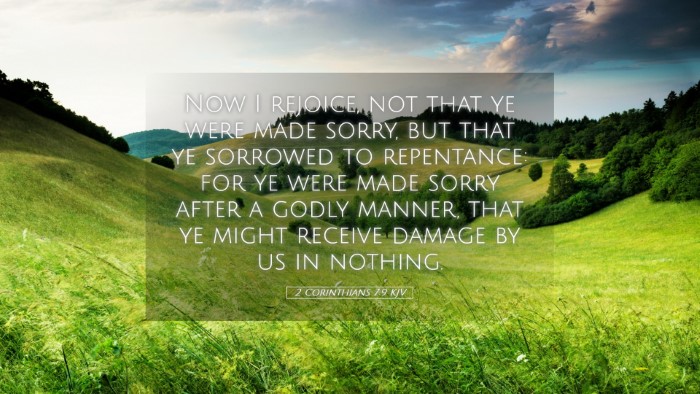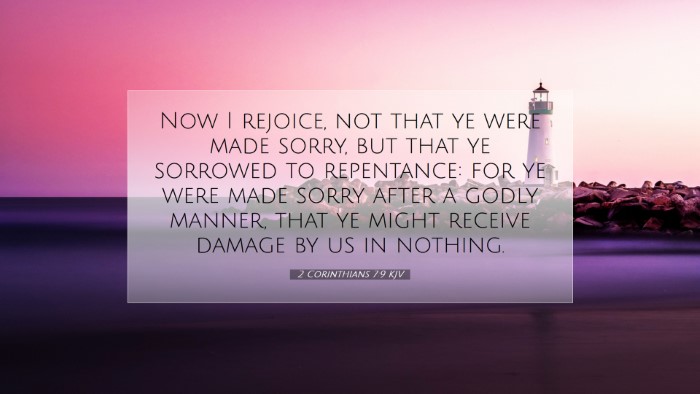Commentary on 2 Corinthians 7:9
2 Corinthians 7:9 states: "Now I rejoice, not that you were made sorry, but that your sorrow led to repentance." This verse showcases the Apostle Paul's understanding of the complex nature of sorrow, repentance, and joy in the Christian life.
Overview of Context
This epistle is a defense of Paul's ministry and an expression of his pastoral concern for the Corinthians. The preceding verses address a confrontation that resulted in sorrow for the church, which Paul initially felt was a heavy burden to bear. However, through divine providence, this sorrow became the catalyst for genuine repentance.
Insights from Public Domain Commentaries
Matthew Henry
Matthew Henry emphasizes the positive outcome of sorrow when it leads to repentance. He notes that Paul does not rejoice in the pain itself but rather in the transformative power of that distress. Sorrow, according to Henry, is an essential component of the Christian experience that can lead to life-changing repentance. He asserts, "True joy springs from true repentance."
Albert Barnes
Albert Barnes reflects on the nature of genuine sorrow and its role in spiritual growth. He comments on the distinction between godly sorrow and worldly sorrow. Barnes states, "The sorrow of the Corinthians was a salutary sorrow, leading to repentance," which signifies a turning away from sin. He underscores that this kind of sorrow is a gift from God, designed to bring believers back into communion with Him. Furthermore, he states that such repentance brings not only reconciliation with God but also restoration of joy.
Adam Clarke
Adam Clarke focuses on the psychological and spiritual implications of sorrow and repentance as discussed in this verse. He notes that while sorrow can be painful, it can also yield valuable spiritual fruit. Clarke remarks, "The end of mourning is to produce a change of life, not to continue in despair." His insights deepen the understanding of how believers can process their grief in a manner that honors God and fosters spiritual renewal. Clarke also stresses that this process is not merely about feeling bad for wrongdoing, but it encompasses a full, heartfelt turning back to God.
Theological Implications
Combining these insights, it becomes clear that the sorrow referred to by Paul is not an end in itself but a means to achieve a closer relationship with God. Within the broader framework of Christian theology, this passage invites believers to embrace their own moments of sorrow as opportunities for growth and deeper understanding of God's grace.
Godly Sorrow vs. Worldly Sorrow
- Godly Sorrow: Leads to repentance and salvation; it is constructive and purifying.
- Worldly Sorrow: Produces despair and regret without leading to change; it is destructive and void of hope.
Practical Applications
For pastors and leaders, this verse serves as a reminder to guide their congregations in understanding the value of sorrow in the Christian life. It's crucial to cultivate an environment where believers can express their struggles and make room for genuine repentance.
- Encourage Reflection: Create opportunities for personal reflection and acknowledgment of sin.
- Promote Healing: Offer support and resources for those experiencing godly sorrow.
- Celebrate Restoration: Highlight stories within the church community where individuals have experienced transformation after repentance.
Conclusion
2 Corinthians 7:9 encapsulates a transformative journey from sorrow to joy through repentance. The insights from Henry, Barnes, and Clarke collectively remind us that godly sorrow is a precursor to repentance, which ultimately leads to a joyful reconciliation with God. This understanding is crucial for anyone studying the complexities of Christian life and ministry.


